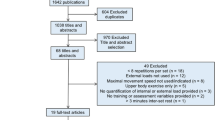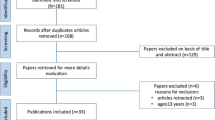Abstract
Background
The balance between training stress and recovery is important for inducing adaptations to improve athletic performance. However, continuously high training loads with insufficient recovery may cause fatigue to accumulate and result in overtraining. A comprehensive systematic review is required to collate overtraining literature and improve the current understanding of the mechanisms underlying functional overreaching (FOR), non-functional overreaching (NFOR) and the overtraining syndrome (OTS) in resistance training.
Objective
The objective of this systematic review was to establish markers of overtraining and elucidate the mechanisms underlying maladaptive resistance training conditions. Furthermore, this review aims to critically evaluate the methodological approaches of the overtraining literature.
Methods
A systematic literature search was performed on PubMed, Web of Science and SPORTDiscus to identify studies up to June 2019. Electronic databases were searched using terms related to resistance training and overtraining. Records were included if they attempted to induce a state of overreaching or overtraining through resistance exercise in healthy participants.
Results
A total of 22 studies were selected for review. Among these studies, eight resulted in decrements in performance and measured changes in performance during a follow-up period. There were four studies that reported decrease in performance yet failed to implement follow-up measures. A total of 10 studies reported no decline in performance. Overall, a lack of standardisation in methodology (follow-up performance testing) and diagnostic criteria prevents consistent determination of FOR, NFOR and OTS in resistance training.
Conclusions
Few studies have appropriately established FOR, NFOR or OTS in resistance training. Overtraining may be related to frequent high-intensity and monotonous resistance training. However, no marker other than a sustained decrease in performance has been established as a reliable indicator of overtraining in resistance exercise.
Registration
This systematic review was registered on the Open Science Framework (https://osf.io/) (https://doi.org/10.17605/osf.io/5bmsp).


Similar content being viewed by others
Data availability statement
All data generated or analysed during this study are included in this published article (and its supplementary information files).
References
Kraemer WJ, Adams K, Cafarelli E, et al. American college of sports medicine position stand. Progression models in resistance training for healthy adults. Med Sci Sports Exerc. 2002;34(2):364–80.
Kraemer WJ, Ratamess NA. Fundamentals of resistance training: progression and exercise prescription. Med Sci Sports Exerc. 2004;36(4):674–88.
Kuipers H, Keizer HA. Overtraining in elite athletes. Sports Med. 1988;6(2):79–92.
Urhausen A, Kindermann W. Diagnosis of overtraining: what tools do we have? Sports Med. 2002;32(2):95–102.
Fry RW, Morton AR, Keast D. Periodisation and the prevention of overtraining. Can J Sport Sci. 1992;17(3):241–8.
Halson SL, Bridge MW, Meeusen R, et al. Time course of performance changes and fatigue markers during intensified training in trained cyclists. J Appl Physiol. 2002;93(3):947–56.
Meeusen R, Duclos M, Foster C, et al. Prevention, diagnosis, and treatment of the overtraining syndrome: joint consensus statement of the European college of sport science and the American college of sports medicine. Med Sci Sports Exerc. 2013;45(1):186–205.
Fry AC, Kraemer WJ. Resistance exercise overtraining and overreaching: neuroendocrine responses. Sports Med. 1997;23(2):106–29.
Fry AC, Webber JM, Weiss LW, et al. Impaired performances with excessive high-intensity free-weight training. J Strength Cond Res. 2000;14(1):54–61.
Moher D, Liberati A, Tetzlaff J, et al. Preferred reporting items for systematic reviews and meta-analyses: the PRISMA statement. PLos Med. 2009;6(7):e1000097.
Fry AC, Kraemer WJ, Ramsey LT. Pituitary-adrenal-gonadal responses to high-intensity resistance exercise overtraining. J Appl Physiol. 1998;85(6):2352–9.
Fry AC, Kraemer WJ, Van Borselen F, et al. Catecholamine responses to short-term high-intensity resistance exercise overtraining. J Appl Physiol. 1994;77(2):941–6.
Fry AC, Kraemer WJ, Van Borselen F, et al. Performance decrements with high-intensity resistance exercise overtraining. Med Sci Sports Exerc. 1994;26(9):1165–73.
Fry AC, Kraemer WJ, Lynch JM, et al. Does short-term near-maximal intensity machine resistance training induce overtraining? J Strength Cond Res. 1994;8(3):188–91.
Fry AC, Kraemer WJ, Stone MH, et al. Endocrine and performance responses to high volume training and amino acid supplementation in elite junior weightlifters. Int J Sport Nutr. 1993;3(3):306–22.
Fry AC, Schilling BK, Weiss LW, et al. Beta2-adrenergic receptor downregulation and performance decrements during high-intensity resistance exercise overtraining. J Appl Physiol. 2006;101(6):1664–72.
Hecksteden A, Skorski S, Schwindling S, et al. Blood-borne markers of fatigue in competitive athletes—results from simulated training camps. PLoS One. 2016;11(2):e0148810.
Margonis K, Fatouros IG, Jamurtas AZ, et al. Oxidative stress biomarkers responses to physical overtraining: implications for diagnosis. Free Radic Biol Med. 2007;43(6):901–10.
Nicoll JX, Fry AC, Galpin AJ, et al. Changes in resting mitogen-activated protein kinases following resistance exercise overreaching and overtraining. Eur J Appl Physiol. 2016;116(11–12):2401–13.
Sterczala A, Fry A, Chiu L, et al. β2-adrenergic receptor maladaptations to high power resistance exercise overreaching. Hum Physiol. 2017;43(4):446–54.
Warren BJ, Stone MH, Kearney JT, et al. Performance measures, blood lactate, and plasma ammonia as indicators of overwork in elite junior weightlifters. Int J Sports Med. 1992;13(5):372–6.
Fahey TD, Pearl MS. The hormonal and perceptive effects of phosphatidylserine administration during 2 weeks of resistive exercise-induced overtraining. Biol Sport. 1998;15(3):135–44.
Fatouros IG, Destouni A, Margonis K, et al. Cell-free plasma DNA as a novel marker of aseptic inflammation severity related to exercise overtraining. Clin Chem. 2006;52(9):1820–4.
Fry AC, Kraemer WJ, Stone MH, et al. Endocrine responses to overreaching before and after 1 year of weightlifting. Can J Sport Sci. 1994;19(4):400–10.
Hasegawa Y, Kurosawa Y, Goto K. The effect of planned overreaching and short-term detraining on jump squat performance. J Aust Strength Cond. 2016;24(7):13–8.
Kraemer WJ, Ratamess NA, Volek JS, et al. The effects of amino acid supplementation on hormonal responses to resistance training overreaching. Metabolism. 2006;55(3):282–91.
Lowery RP, Joy JM, Rathmacher JA, et al. Interaction of beta-hydroxy-beta-methylbutyrate free acid and adenosine triphosphate on muscle mass, strength, and power in resistance trained individuals. J Strength Cond Res. 2016;30(7):1843–54.
Raastad T, Glomsheller T, Bjoro T, et al. Changes in human skeletal muscle contractility and hormone status during 2 weeks of heavy strength training. Eur J Appl Physiol. 2001;84(1–2):54–63.
Ratamess NA, Kraemer WJ, Volek JS, et al. The effects of amino acid supplementation on muscular performance during resistance training overreaching. J Strength Cond Res. 2003;17(2):250–8.
Sweeny M, Brilla L, Suprak D, et al. Comparison of linear and daily undulating periodization in resistance training using simple measures of overreaching. Med Sci Sports Exerc. 2011;43(Suppl 1):836.
Wilson J, Lowery R, Joy J, et al. The effects of 12 weeks of beta-hydroxy-beta-methylbutyrate free acid supplementation on muscle mass, strength, and power in resistance-trained individuals: a randomized, double-blind, placebo-controlled study. Eur J Appl Physiol. 2014;114(6):1217–27.
Gentles JA, Phillips SM. Discrepancies in publications related to HMB-FA and ATP supplementation. Nutr Metab. 2017;14(1):42.
Keogh J, Hume PA, Pearson SJJOS. Retrospective injury epidemiology of one hundred one competitive Oceania power lifters: the effects of age, body mass, competitive standard, and gender. J Strength Cond Res. 2006;20(3):672–81.
McGuigan MR, Foster C. A new approach to monitoring resistance training. J Strength Cond Res. 2004;26(6):42.
Bruin G, Kuipers H, Keizer H, et al. Adaptation and overtraining in horses subjected to increasing training loads. J Appl Physiol. 1994;76(5):1908–13.
Cadegiani FA, Kater CE. Hormonal aspects of overtraining syndrome: a systematic review. BMC Sports Sci Med Rehabil. 2017;9(1):14.
Kreider RB, Fry AC, O’Toole ML. Overtraining in sport. Champaign: Human Kinetics; 1998.
Author information
Authors and Affiliations
Corresponding author
Ethics declarations
Funding
No sources of funding were used to assist in the preparation of this article.
Conflict of interest
Clementine Grandou, Lee Wallace, Franco M. Impellizzeri, Nicholas G. Allen and Aaron J. Coutts declare that they have no conflicts of interest relevant to the content of this review.
Electronic supplementary material
Below is the link to the electronic supplementary material.
Rights and permissions
About this article
Cite this article
Grandou, C., Wallace, L., Impellizzeri, F.M. et al. Overtraining in Resistance Exercise: An Exploratory Systematic Review and Methodological Appraisal of the Literature. Sports Med 50, 815–828 (2020). https://doi.org/10.1007/s40279-019-01242-2
Published:
Issue Date:
DOI: https://doi.org/10.1007/s40279-019-01242-2




